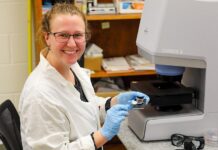
COOKEVILLE – Cookeville Regional Medical Center (CRMC) is the first facility in the Upper Cumberland to use the TactiCath Quartz irrigated ablation catheter, a new ablation technology available for patients being treated for paroxysmal atrial fibrillation (AF). The technology was designed to provide physicians with an objective measure of the force a catheter applies to a patient’s heart in order to create more effective lesions during ablation procedures.
The first procedure in the Upper Cumberland was performed by Mark Wathen, M.D., electrophysiologist and heart arrhythmia specialist with the Heart and Vascular Center at Cookeville Regional and Tennessee Heart.
“Atrial fibrillation is quite common and can cause serious discomfort and significant problems for patients,” Wathen said. “It is important to treat the condition, and if medications don’t work well for the patient, it often requires cardiac ablation, a minimally invasive procedure that can correct heart rhythm problems. This new Tacticath technology improves the efficiency and effectiveness of the procedure. As the only electrophysiology lab between Nashville and Knoxville, we are committed to providing the most effective treatment solutions for heart rhythm problems.”
The TactiCath Quartz ablation catheter provides Wathen and other electrophysiologists the ability to monitor the amount of pressure that a catheter tip exerts on the endocardium (the layer of tissue that lines the chambers of the heart). Without contact-force sensing technology, physicians have to estimate by touch with their hands the amount of force applied to the heart wall during an ablation. If too little force is applied, effective lesions may not be created and AF may recur, potentially requiring additional treatments. When too much force is applied, there’s a risk of tissue injury, which can lead to serious procedure-related complications.
Ablation catheters, such as the TactiCath Quartz irrigated ablation catheter, are thin, flexible wires used to help treat irregular heartbeats that impair the heart’s ability to effectively pump blood throughout the body. In the U.S., an estimated 2.7 million people are impacted by AF, making the condition the most common type of arrhythmia affecting Americans today.
For more information about AF, visit http://health.sjm.com/arrhythmia-answers.









